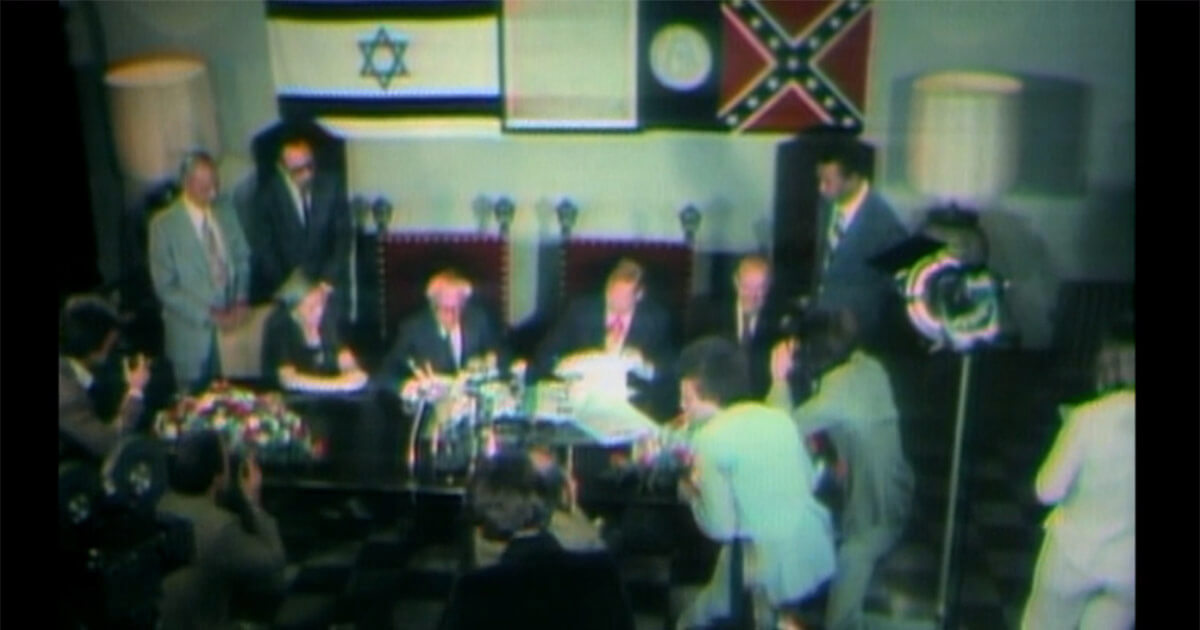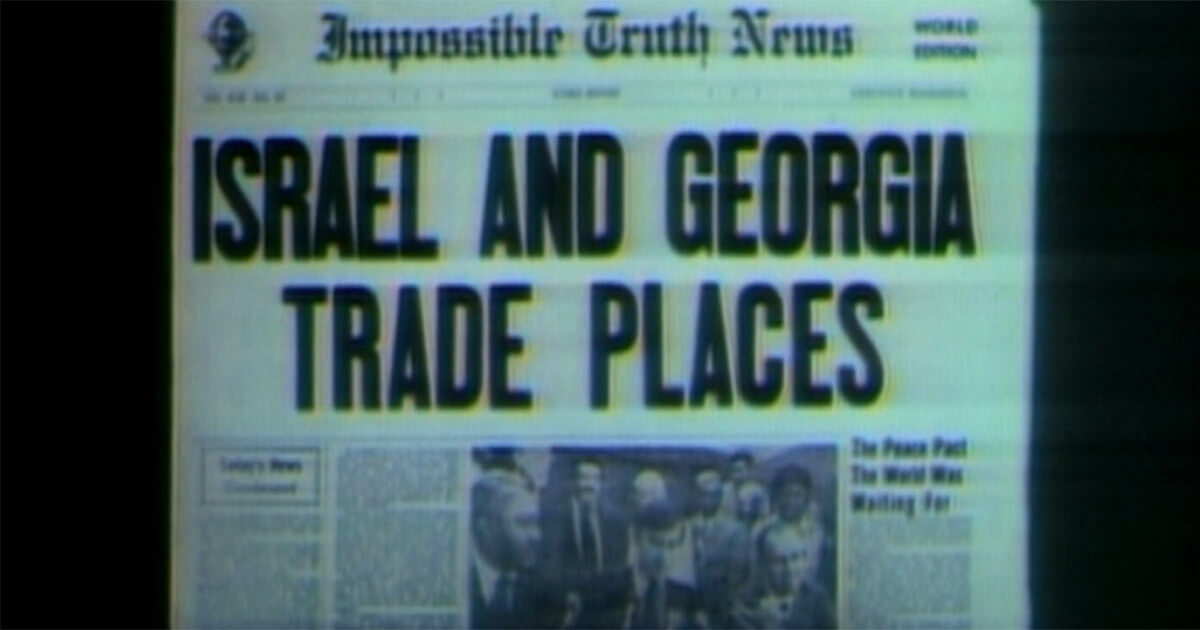SNL has been joking about Israel for 50 years
Saturday Night Live’s first episode featured a short fake news reel by Albert Brooks that had Israel and Georgia switch places

Leaders of Israel and the state of Georgia sign documents to switch places in a sketch on the first episode of ‘Saturday Night Live.’ Courtesy of NBC
Fifty years before President Donald Trump proposed that the U.S. should take over Gaza, Saturday Night Live — in its very first episode on Oct. 11, 1975 — introduced a land swap solution to Middle East peace: The state of Israel and the state of Georgia could switch places.
The swap was the subject of a short film by Albert Brooks that aired on SNL. The conceit: A news broadcast airs a press conference with an announcement. Several politicians are seated at a long table, flanked by flags.
“In an unprecedented move to ease world tensions,” a narrator declares, “the country of Israel and the state of Georgia have agreed to change places. “The entire state of Georgia — residents, businesses, all forms of commerce — will relocate in the Middle East on January 1st, 1977. No buildings will be moved. It will be an even property exchange.”
The camera cuts to the Israeli leader: “I hope that New Orleans will be easier to deal with than Cairo,” and the representative from Georgia adds, “I know that my entire state is looking forward to heat without humidity.”

And like so much of Brooks’ work, the brilliance wasn’t just in the premise, but in the delivery: the faux-statesmanlike tone, the stentorian voiceover, the poker-faced bureaucrats treating this as a rational solution to a problem that no one in history has yet solved, as if had only someone thought to use a whiteboard and bullet points, the whole thing would be wrapped up by Purim.
More importantly, the film hinted at something that SNL would later become famous for: its ability to poke fun at politics through the language of media itself. The Israel-Georgia switch wasn’t just a surreal premise; it was a spot-on parody of the way major geopolitical crises were often framed in America, as if they were corporate mergers that just needed the right sales pitch.
It was the same logic that would later power hundreds of segments on Weekend Update and, decades later, The Daily Show with Jon Stewart, which treat real-world insanity with the detached dryness of a Sunday morning talk show.
What Brooks was skewering wasn’t the logistics — it was the American impulse to view the Middle East as a puzzle to be solved in a way that makes sense to us. The joke was the arrogance of thinking a centuries-old conflict could be restructured like a zoning law.
This was the 1970s, after all — just two years after the Yom Kippur War, when the Arab-Israeli conflict was a big deal, but for most Americans, it was also a faraway deal. Something you heard about in short bursts on the evening news between Walter Cronkite segments about gas shortages and Patty Hearst. The humor in Brooks’ bit came from that distance: What if the whole mess could just be relocated, preferably to the home state of Coca-Cola.

Before Saturday Night Live launched, Lorne Michaels, its creative mastermind, had tried to recruit Brooks, a fellow Jew, as a regular performer. Brooks, who was already a rising star in stand-up, turned him down. But he agreed to contribute pre-taped segments, seven of which aired during the show’s first two seasons.
His pieces were some of the strangest things to air on the show in its infancy, and didn’t quite fit the energy of the live sketches surrounding them. Eventually, the show moved in a different direction, and Brooks, based across the country in Los Angeles, moved on to making movies.
But his fingerprints left their mark on SNL: in the mock seriousness of a well-crafted fake news bit, in the satirical commercials that blur politics with advertising, in the SNL digital shorts from Lonely Island and Please Don’t Destroy and in the persistent idea that some of the funniest material comes from treating the dumbest ideas with absolute sincerity.
And in a way, the fact that the Israel-Georgia joke still resonates 50 years later is proof that Brooks was onto something. The conflicts haven’t changed. The way Americans misunderstand them hasn’t changed. And the idea that someone, somewhere, still thinks this whole situation could be solved with a land swap? Well, that hasn’t changed either.
NBC will re-air the first episode of Saturday Night Live on Feb. 15 at 10 p.m. It is also available to stream on Peacock.
















